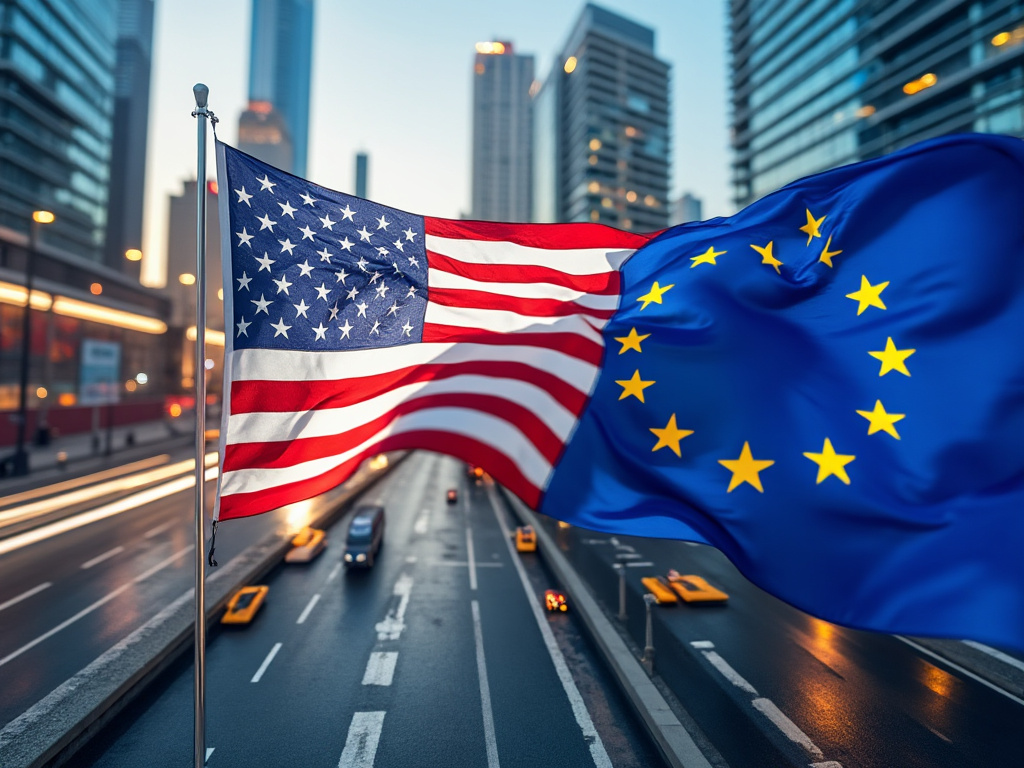
EU Readies Response to New US Tariffs Amid Calls for Dialogue
Ursula von der Leyen expresses regret over US tariffs and emphasizes the need for negotiation.
Ursula von der Leyen, the President of the European Commission, has announced that the European Union is preparing to respond to newly imposed US tariffs, described as sweeping and particularly damaging.
In a video address, von der Leyen urged US President Donald Trump to engage in dialogue instead of escalating the trade conflict.
"I deeply regret this choice," von der Leyen stated, noting the chaos that the tariffs are causing among US trading partners.
She highlighted that the new tariffs, which impose a 20 percent levy on the EU, would have immediate effects on consumers globally, leading to increased costs for groceries, medication, and transportation, potentially contributing to rising inflation.
Von der Leyen indicated that the EU is prepared to take countermeasures to safeguard its businesses if negotiations do not proceed successfully.
The situation is exacerbated by concerns that higher US customs duties could result in an influx of cheap goods from countries like China, which the EU is closely monitoring.
Emphasizing Europe’s commitment to its industries, von der Leyen pledged support for businesses directly impacted by these tariffs.
Trade Commissioner Bernd Lange criticized the US tariffs as "unjustified, illegal, and disproportionate," expressing skepticism about the current US administration's willingness to engage in constructive dialogue with the EU.
In a related development, Maroš Šefčovič, the European Commissioner for Trade and Economic Security, has recently visited China, signaling a shift towards a more nuanced strategy in the EU's approach to Sino-European trade relations.
During his trip, he met with high-ranking Chinese officials to discuss ways to rebalance trade and improve market access for both parties.
This visit follows a trip to Washington, reflecting the EU's priorities in navigating its relationships with both superpowers.
The EU and China are working to address challenges in their trade relationships, marked by a significant trade deficit for the EU and ongoing disputes regarding subsidies and market access.
In 2024, the EU’s trade deficit with China was recorded at €304.5 billion, while Chinese foreign direct investment in the EU reached €185 billion.
Separately, French President Emmanuel Macron has called for European companies to consider freezing investments in the United States in response to the tariffs.
This reflects growing discontent among EU leaders regarding US trade policies and their potential ramifications for European businesses.
Additionally, recent events have demonstrated the geopolitical tensions surrounding international trade, heightened by US President Trump's administration's unilateral approaches.
European officials are responding by emphasizing the need for unity and a principled stance against economic coercion, as they navigate the complexities of global trade dynamics and their relationships with both the US and China.
In a video address, von der Leyen urged US President Donald Trump to engage in dialogue instead of escalating the trade conflict.
"I deeply regret this choice," von der Leyen stated, noting the chaos that the tariffs are causing among US trading partners.
She highlighted that the new tariffs, which impose a 20 percent levy on the EU, would have immediate effects on consumers globally, leading to increased costs for groceries, medication, and transportation, potentially contributing to rising inflation.
Von der Leyen indicated that the EU is prepared to take countermeasures to safeguard its businesses if negotiations do not proceed successfully.
The situation is exacerbated by concerns that higher US customs duties could result in an influx of cheap goods from countries like China, which the EU is closely monitoring.
Emphasizing Europe’s commitment to its industries, von der Leyen pledged support for businesses directly impacted by these tariffs.
Trade Commissioner Bernd Lange criticized the US tariffs as "unjustified, illegal, and disproportionate," expressing skepticism about the current US administration's willingness to engage in constructive dialogue with the EU.
In a related development, Maroš Šefčovič, the European Commissioner for Trade and Economic Security, has recently visited China, signaling a shift towards a more nuanced strategy in the EU's approach to Sino-European trade relations.
During his trip, he met with high-ranking Chinese officials to discuss ways to rebalance trade and improve market access for both parties.
This visit follows a trip to Washington, reflecting the EU's priorities in navigating its relationships with both superpowers.
The EU and China are working to address challenges in their trade relationships, marked by a significant trade deficit for the EU and ongoing disputes regarding subsidies and market access.
In 2024, the EU’s trade deficit with China was recorded at €304.5 billion, while Chinese foreign direct investment in the EU reached €185 billion.
Separately, French President Emmanuel Macron has called for European companies to consider freezing investments in the United States in response to the tariffs.
This reflects growing discontent among EU leaders regarding US trade policies and their potential ramifications for European businesses.
Additionally, recent events have demonstrated the geopolitical tensions surrounding international trade, heightened by US President Trump's administration's unilateral approaches.
European officials are responding by emphasizing the need for unity and a principled stance against economic coercion, as they navigate the complexities of global trade dynamics and their relationships with both the US and China.
Translation:
Translated by AI
AI Disclaimer: An advanced artificial intelligence (AI) system generated the content of this page on its own. This innovative technology conducts extensive research from a variety of reliable sources, performs rigorous fact-checking and verification, cleans up and balances biased or manipulated content, and presents a minimal factual summary that is just enough yet essential for you to function as an informed and educated citizen. Please keep in mind, however, that this system is an evolving technology, and as a result, the article may contain accidental inaccuracies or errors. We urge you to help us improve our site by reporting any inaccuracies you find using the "Contact Us" link at the bottom of this page. Your helpful feedback helps us improve our system and deliver more precise content. When you find an article of interest here, please look for the full and extensive coverage of this topic in traditional news sources, as they are written by professional journalists that we try to support, not replace. We appreciate your understanding and assistance.











